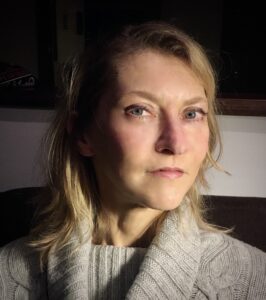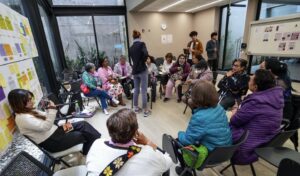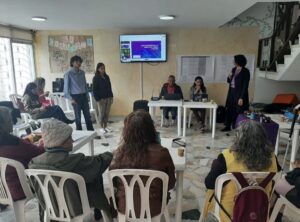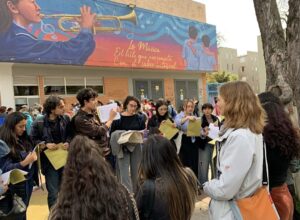Multi-sectoral change has led to Bogotá, Colombia, a deeply unequal and fragmented city, being a global exemplar of sustainable development. Significant research has been conducted on the city’s “best practice” sustainable mobility infrastructure, which has been widely transferred and adopted around the world. A more recent equitable urban development shift has occurred in the city, centered around the needs of unpaid female caregivers.
In Bogotá, 88% of girls and women engage in unpaid care work and 27% of them spend an average of 6 or more hours per day doing unpaid care work. Low-income neighborhoods have the highest concentration of unpaid caregivers. A new Care System initiative aims to give women more time and autonomy by enabling the equitable distribution of unpaid domestic care work across genders.
The program involves both reorganization of new and existing physical infrastructure and the provision of clustered services, distributed across the city and managed by integrated institutions from multiple sectors.
“The caring woman is in the center”
The Manzanas del Cuidado (Care Blocks) program in Bogotá supports unpaid female caregivers to receive rest, education and other services. The innovative public policy has gained international acclaim, but partners on the Change Stories project want the full story of how this program was created to include the unheard voices of instrumental female activists in Bogotá.
Sergio Montero, Associate Professor at University of Toronto explains that “it is also important that we tell that story well, because if we tell this story only as a mayor who came up with the great idea then we are obscuring and covering up the role that for example here women had, the feminist movements or the Women’s Advisory Council.”
Of the policy innovation, Catalina Ortiz, Professor at University College London, says “This process is fascinating because the issues of care have always been invisible. They have always been there, but the relevance they have is never given to them. We forget that what makes and supports the city is precisely the care work, which in a dominant patriarchal system has always been more relegated to a group of the population led by women.”
“We exist because we resist”
A key site of the Change Stories research in Bogotá has been El Castillo de las Artes (The Arts Palace). Formerly one of the largest brothels in Bogotá, El Castillo is now the Care Block of the Los Mártires district, located in Santafé, a neighborhood with one of the strongest social movements and most consolidated forms of institutional participation in the city, despite conditions of urban vulnerability and marginalization. The video “The Retaking of the Castle” tells the story of the place and the fundamental role of community participation and exceptional civil servants, including community leaders and activists from diverse social movements, in shaping the inclusive character of the space, as well as in ensuring its sustainability beyond state intervention. The video was made by Lorenzo Garcia Marinno, one of the students and young Change Stories researchers from Universidad de los Andes.
Partners

María José (Majo) Álvarez Rivadulla, Associate Professor of Sociology at Universidad de los Andes. Álvarez-Rivadulla holds a BA in Social Work from Universidad de la República (Uruguay) and an MA and PhD in Sociology from University of Pittsburgh. She studies social inequality using mixed-methods. Her book, Squatters and the Politics of Marginality (Springer, 2017), tells the political history of squatting in Montevideo. She has also worked and published on residential segregation, popular neighborhoods and urban interventions, social housing, tolerance to inequality, middle classes, gated communities, interclass relations in college and social mobility.

Sebastián Orlando Espejo Fandiño is a research project professional at Universidad de los Andes. He is an anthropologist and holds a MA in Sociology. His research focuses on urban governance and citizen participation. His work explores activism and institutionalized participation, particularly through ethnographic studies of citizen councils and feminist movements in Bogotá, Colombia.

Friederike Fleischer, Associate Professor of Anthropology, at Universidad de los Andes. Fleischer holds a PhD in Anthropology from City University of New York. Her research in China and Colombia centers on processes of socioeconomic and spatial stratification; social life and inequality; and social support and wellbeing in urban contexts. She has authored several books including Soup, Love, and a ‘Helping Hand’: Social Support in Guangzhou, China (Berghahn, 2018) and co-edited the volume titled Ethnographies of Support (Palgrave, 2013). She is a former Research Fellow at the Max Planck Institute for Social Anthropology in Germany.

María José Gómez is a Research Assistant for the Change Stories project in Bogotá. She holds a Master’s degree in Sociology and a Bachelor’s in Political Science. Her research interests include urban inequality and social policy, with a focus on qualitative approaches to understanding social change.

Adriana Hurtado Tarazona, Associate professor in planning, governance and territorial development at the Interdisciplinary Centre of Development Studies (Cider), Universidad de los Andes. Tarazona holds a PhD in anthropology and an MSc in regional development planning and management. Hurtado Tarazona has worked as a researcher, lecturer and consultant in urban, land and housing policy, urban and metropolitan management, inequalities, social housing and informality.

Olga Lucia Sarmiento, Professor of the Department of Public Health at the School of Medicine and director of the Group of Epidemiology at Universidad de los Andes. Sarmiento holds an MD from the Universidad Javeriana (Bogotá) and an MPH and PhD from the Department of Epidemiology at the School of Public Health at the University of North Carolina at Chapel Hill. Her transdisciplinary research focuses on the relationship between the built environment, policy and healthy behaviors in Latin America.
Consejo Consultivo de Mujeres (CCM) is a women’s advisory group for issues of gender equality that unites different women’s organizations, groups and networks of Bogotá. Local government must work with the council in developing and implementing all aspects of the Public Policy on Women and Gender Equality, including the city system of care and the blocks of care.

Photo credit: Gabriel Linares
On October 19th, 2024, a Collective Memory event with the Women’s Advisory Council of Bogotá was held at Universidad de los Andes. This event highlighted the key role of women’s participation and representation in the development of the Public Policy on Women and Gender Equality in the District, as well as in the defense of rights and the promotion of active citizenship in Bogotá. During the gathering, we heard the voices and experiences of those who have contributed to the construction of the Council from 2007 to 2024. It was an opportunity for reunion among former colleagues and a first meeting for advisory council members who had not yet met. Omar Rincón from Universidad de los Andes captured stories of political participation, women leadership and achievements of council women in urban governance in a vibrant video “Bogotá of and for women”.

Photo credit: Gabriel Linares
Leaders in the Women’s Advisory Council have long called for recognition and visibility, emphasizing that grassroots organizations, despite their crucial contributions, remain undervalued by the State and invisible to the broader public. While Claudia López Hernández, Bogotá’s first woman mayor, was an ally in advancing care as public policy, care policy and feminist urbanism did not begin with her administration. Storytelling otherwise reveals a much longer history of institutionalized participation in Bogotá and the progressive development of feminist urban policy, driven by a strong women’s movement and other allied political actors.

Photo credit: Blanca Yulima Lombana González
The change stories in Bogotá tell us about the importance of militant bureaucrats—civil servants who share a political conscience about the unequal distribution of care labor, violence, freedom, resources, and rights between men and women, and who are deeply committed to reducing that imbalance—working alongside bureaucratized militants—feminist activists who entered the state from grassroots organizing. Together, they have carved out new spaces for feminist policy within the city. Over the past two years, participatory research with the Women’s Advisory Council has allowed us to recover and highlight a counternarrative—one that foregrounds the role of popular feminisms, grassroots women’s movements, and institutional participation in shaping Bogotá’s political agenda.

Photo credit: Miguel Hernando Torres
A key line of research in Bogotá has focused on health. We have employed multimethod and mixed-method approaches, combining tools that capture lived experiences with instruments that allow for broader statistical analysis. Qualitatively, we used digital diaries as a tool for researching well-being among users of the Care Blocks in Bogotá’s District Care System. Participants used this tool to record their weekly experiences and everyday anecdotes related to the Care Blocks. We assessed whether attendance to services was consistent, whether the relationships forged between users and bureaucrats in these spaces became closer, whether trust was built over time, and how care burdens intersect with well-being. Further, quantitatively, we evaluated indicators of healthy habits and subjective well-being through descriptive statistics, and carried out surveys aimed at assessing, at the micro level, the formation of social networks and their interaction with indicators of well-being and social cohesion. This work has involved both undergraduate and graduate students from multiple faculties and areas of knowledge.

Photo credit: Sebastián Orlando Espejo Fandiño
As part of our commitments with the Women’s Advisory Council, the Universidad de los Andes, together with the ‘Centro de Formación Política’ (CEP – Center for Political Formation), offered the course: Social Leadership for Political Advocacy. The course began by acknowledging the profound political inequality in Colombia, particularly in collective decision-making processes. With the aim of reducing this gap and strengthening political advocacy, the program sought to expand the knowledge of women community leaders about how the State functions at the local level, while also enhancing their organizational, financial, communication, and leadership skills. Through a theoretical-practical approach, participants developed abilities for teamwork, active participation in their communities, and the management of local projects. They also learned to effectively communicate their initiatives, helping increase both their reach and impact. This enabled delegates from our CBO partners, along with other leaders of grassroots care initiatives, to strengthen their political, communication, and negotiation capacities.